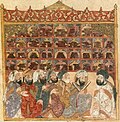Aalim
Aalim (Arabic: عالِم; plural: Ulama) in its original meaning is known as a scholar.[1] More specifically, in Sunni Islam, an aalim is regarded as the one who protects and explains religious knowledge of Islam.[2] Ulama are educated in religious schools called madrasas. By tradition, a student who had completed his studies was accepted by his teacher. The student was given the permission for teaching and for giving lawful opinions, called fatwa. Through time, this practice established a chain of teachers and pupils.[3][4]
Branches of learning
The branches of learning include, Theology, Mysticism, Law, Philosophy and Ethics.
Aalim Media
Scholars at an Abbasid library. Maqamat of al-Hariri. Illustration by Yahyá al-Wasiti, Baghdad, 1237.
Endowment Charter (Waqfiyya) of the Hürrem Sultan Mosque, Madrasa and Imaret (soup-kitchen). AD 1556–1557 (AH 964). Museum of Turkish and Islamic Arts
References
- ↑ A.C. Brown, Jonathan (2014). Misquoting Muhammad: The Challenge and Choices of Interpreting the Prophet's Legacy. Oneworld Publications. p. 3. ISBN 978-1-78074-420-9. The ulama (literally, the learned ones)
- ↑ Hunwick, J. O.; Lin, Chang-Kuan; Hooker, M. B.; Nizami, K. A.; Repp, R. C.; Gilliot, Cl (24 April 2012). "ʿUlamāʾ". Encyclopaedia of Islam, Second Edition. doi:10.1163/1573-3912_islam_com_1278. S2CID 241694047 – via referenceworks.brillonline.com.
- ↑ Makdisi, George (1 April 1989). "Scholasticism and Humanism in Classical Islam and the Christian West". Journal of the American Oriental Society. 109 (2): 175–182. doi:10.2307/604423. JSTOR 604423.
- ↑ Graham, William (1993). "Traditionalism in Islam: An essay in interpretation". Journal of Interdisciplinary history. 23 (3): 495–522.




